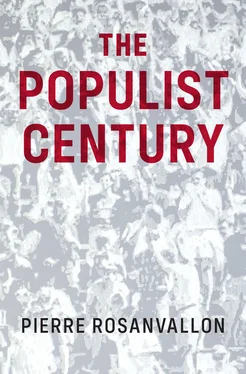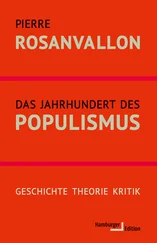We must also recall that the development of many populist movements – and this is particularly apparent in Europe – has often been linked to the assertion of regional separatisms: regions refusing to be part of a fiscal and redistributive community that would include populations deemed no longer to be part of a common world, owing to their behavior as entities that “profit” from the welfare state. The Lega (League) in Italy 9and the Vlaams Belang (Flemish Interest) in Belgium 10are exemplary archetypes. 11One of the strengths of a movement like Matteo Salvini’s League lies in its ability to transcend the regionalist sentiment by “nationalizing” it, transferring the rejection of the South in Italy onto a critique of European institutions. The adversary is no longer “Roma Ladrona” (Rome the Thief), but the Brussels bureaucracy, drunk on regulations, an insidious machine for dispossessing peoples of their sovereignty. This is why the anti-European dimension is now one of the essential markers of populism on the continent. It gives a more modern and more readily acceptable tonality to a nationalism that is in fact highly traditional.
Protectionism as an instrument of security
Control of a border, especially by building walls or fences, is a major way of asserting sovereignty over a territory. It also participates directly in a politics of security, mirroring the ancient ramparts that used to surround cities. There is a continuum between this physical protectionism and a politics of internal security. Preventing foreigners and undesirables from crossing the borders also belongs to an expanded vision of security that includes keeping populations deemed dangerous for the maintenance of national cohesion at a distance. The notion of cultural insecurity extends this approach by encouraging the rejection of ideologies judged threatening to the identity of a people. (Muslim populations combine the two variables.) Independence thus also means defending identity and homogeneity, in all possible ways. The various facets of national protectionism constitute a major axis of populist political culture.
1 1 François Guizot, speech delivered April 1, 1846 (in a discussion of a trade agreement with Belgium), in François Guizot, Histoire parlementaire de France (Paris: Michel-Lévy frères, 1864), vol. 5, p. 120.
2 2 See Friedrich List, National System of Political Economy, trans. George-Auguste Matile, Henri Richelot, and Stephen Colwell (Philadelphia: J. B. Lippincott, 1856 [1841]); citation from p. 77. List’s stance was different from that of Johann Gottlieb Fichte, who advocated an autarchic protectionism along political lines.
3 3 As reflected in the familiar watchword “There is no alternative” (TINA).
4 4 See the emblematic work of Alain Supiot, Governance by Numbers: The Making of a Legal Model of Allegiance, translated from the French (Portland, OR: Hart, [2015] 2017). Let us note that the question of the comparative virtues of management through fixed rules as opposed to an approach that privileges political decision-making has been addressed in numerous works in economic theory. See the seminal article of Finn E. Kydland and Edward C. Prescott, “Rules Rather than Discretion: The Inconsistency of Optimal Plans,” Journal of Political Economy 85, no. 3 (1977): 473–91.
5 5 Marine Le Pen, Pour que vive la France (Paris: Grancher, 2012); the book was her manifesto in the 2012 presidential campaign.
6 6 Jacques Généreux, Nous, on peut! Manuel anticrise à l’usage du citoyen, 2nd edn. (Paris: Seuil, 2012).
7 7 “The irreversible character of the installation of immigrant populations,” Marcel Gauchet notes, characteristically, “… presents the interesting feature of having totally avoided, from beginning to end, all debate and democratic decision-making.” Gauchet also speaks in this connection of a “wounded popular feeling of sovereignty,” emphasizing moreover that “xenophobia is not racism,” that it is rather a “feeling that one can contain within the circle of democracy” (La démocratie contre elle-même [Paris: Gallimard, 2002], pp. 220–2).
8 8 On this point, see my analysis in The Society of Equals, trans. Arthur Goldhammer (Cambridge, MA: Harvard University Press, [2011] 2013).
9 9 Let us recall that the original name of this political party (in 1989) was “Northern League for the Independence of Padania.”
10 10 This party stressed from the start the greater expenses of the welfare state in Wallonia.
11 11 Let us note that various social scientists have emphasized the connection between the homogeneity of populations and the willingness to accept redistributive activities: see for example Robert Putnam, “E Pluribus Unum: Diversity and Community in the Twenty-First Century,” Scandinavian Political Studies 30, no. 2 (2007): 137–74, or Alberto Alesina and Edward L. Glaeser, Fighting Poverty in the US and Europe: A World of Difference (Oxford: Oxford University Press, 2004).
Конец ознакомительного фрагмента.
Текст предоставлен ООО «ЛитРес».
Прочитайте эту книгу целиком, купив полную легальную версию на ЛитРес.
Безопасно оплатить книгу можно банковской картой Visa, MasterCard, Maestro, со счета мобильного телефона, с платежного терминала, в салоне МТС или Связной, через PayPal, WebMoney, Яндекс.Деньги, QIWI Кошелек, бонусными картами или другим удобным Вам способом.












